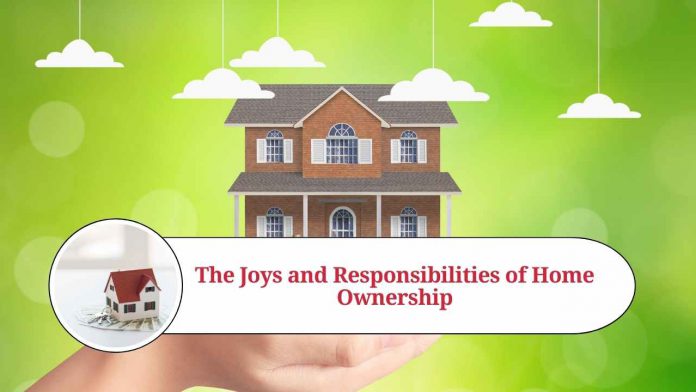Introduction of Joys and Responsibilities
Owning a home is a dream that many people aspire to achieve. It represents stability, security, and a sense of belonging. While the journey to home ownership may come with its challenges, the rewards and benefits far outweigh the effort. In this blog, we will explore the joys and responsibilities of owning a home and delve into why it remains a significant milestone in people’s lives.
- Building Equity: One of the most appealing aspects of home ownership is the opportunity to build equity. As you make mortgage payments over time, you gradually increase your ownership stake in the property. Unlike renting, where you’re essentially paying someone else’s mortgage, each payment contributes to your long-term investment. This equity can provide financial security and serve as a valuable asset for future endeavors.
- Personalization and Stability: Owning a home allows you to create a space that truly reflects your personality and style. You have the freedom to personalize and modify your living environment to suit your preferences. From painting the walls to landscaping the backyard, you have the ability to make your home uniquely yours. Additionally, homeownership provides stability, as you are not subject to the uncertainties of rental agreements or the whims of landlords. You have control over your living situation and can establish roots within your community.
- Sense of Community: Homeownership often fosters a stronger sense of community. When you own a home, you are more likely to invest in and engage with the neighborhood. You have the opportunity to build relationships with neighbors, participate in local events, and contribute to the well-being of the community. This sense of belonging can provide a support network and enhance your overall quality of life.
- Financial Benefits: While purchasing a home involves upfront costs and ongoing expenses, it can offer several financial benefits in the long run. Firstly, mortgage payments build equity, as mentioned earlier. Secondly, homeownership allows you to take advantage of tax deductions, such as deducting mortgage interest and property taxes. Additionally, as property values generally appreciate over time, owning a home can be a smart investment, potentially leading to increased wealth.
- Sense of Accomplishment: Achieving the goal of homeownership is a significant accomplishment for many individuals and families. It symbolizes hard work, determination, and financial responsibility. The sense of pride that comes with owning a home is unparalleled, as it represents a milestone that signifies stability and success. It also provides a sense of security, knowing that you have a place to call your own and build a future.
Responsibilities of Homeownership: While the benefits of owning a home are numerous, it is important to acknowledge the responsibilities that come with it. Homeowners must budget for mortgage payments, property taxes, insurance, and maintenance costs. Regular upkeep, repairs, and renovations are necessary to preserve the value and condition of the property. Additionally, homeowners are accountable for adhering to local regulations and community guidelines. Despite these responsibilities, the rewards of homeownership make the efforts worthwhile.
Conclusion
Owning a home offers a multitude of joys and benefits. From building equity and personalizing your space to establishing roots in a community, the advantages of homeownership extend far beyond mere property ownership. While the journey may present challenges and responsibilities, the sense of accomplishment and financial security that come with owning a home make it a significant milestone in one’s life.
Frequently Asked Questions (FAQs)
Q. How do I know if I’m ready to buy a home?
Determining your readiness for homeownership involves assessing your financial situation, stability, and long-term goals. Consider factors such as your income, credit score, savings for a down payment, and ability to handle ongoing expenses like mortgage payments, property taxes, and maintenance. It’s also important to evaluate your commitment to staying in one location for an extended period.
Q. Should I buy a home or continue renting?
The decision between buying a home and renting depends on various factors, including your financial situation, lifestyle, and personal preferences. Renting offers flexibility and less responsibility, but you’re essentially paying for someone else’s property. Homeownership provides stability, potential financial benefits, and the opportunity to personalize your living space. Evaluate your long-term goals and weigh the pros and cons to make an informed decision.
Q. How much down payment do I need to buy a home?
The down payment required to purchase a home typically ranges from 5% to 20% of the home’s purchase price. However, the exact amount depends on various factors, including the type of mortgage loan you qualify for, your credit history, and the lender’s requirements. It’s advisable to save as much as possible for a down payment to reduce the loan amount and potentially secure better mortgage terms.
Q. What are closing costs, and how much should I budget for them?
Closing costs are fees and expenses associated with finalizing the purchase of a home. They typically include charges such as appraisal fees, title insurance, attorney fees, lender fees, and prepaid expenses like property taxes and homeowners insurance. Closing costs generally range from 2% to 5% of the home’s purchase price. However, these costs can vary based on factors such as location, loan type, and specific circumstances. It’s essential to budget for closing costs in addition to the down payment.
Q. What ongoing expenses should I consider as a homeowner?
Beyond mortgage payments, homeownership comes with additional expenses. These include property taxes, homeowners insurance, regular maintenance costs (such as repairs, landscaping, and general upkeep), utilities, and potentially homeowners association (HOA) fees. It’s important to budget for these expenses to ensure you can comfortably afford the total cost of owning a home.
Q. How does homeownership affect my taxes?
Homeownership can offer potential tax benefits. For example, you may be able to deduct mortgage interest and property taxes from your taxable income, which can lower your overall tax liability. It’s advisable to consult with a tax professional to understand how homeownership specifically impacts your tax situation, as it can vary based on individual circumstances and local tax laws.
Q. What if I can’t afford a home in my desired location?
If your desired location is financially out of reach, you may consider exploring other options. This could involve expanding your search to nearby areas with more affordable housing, considering smaller or fixer-upper homes, or exploring different financing options, such as government-backed programs or down payment assistance programs. It’s important to be flexible and realistic about your budget to find a home that meets your needs.
Q. What should I consider when choosing a mortgage lender?
When selecting a mortgage lender, consider factors such as interest rates, loan terms, customer service, reputation, and fees. Shop around and compare multiple lenders to find the best fit for your needs. Additionally, it can be helpful to seek recommendations from trusted sources or work with a reputable mortgage broker who can assist in finding suitable lenders and loan options.




















